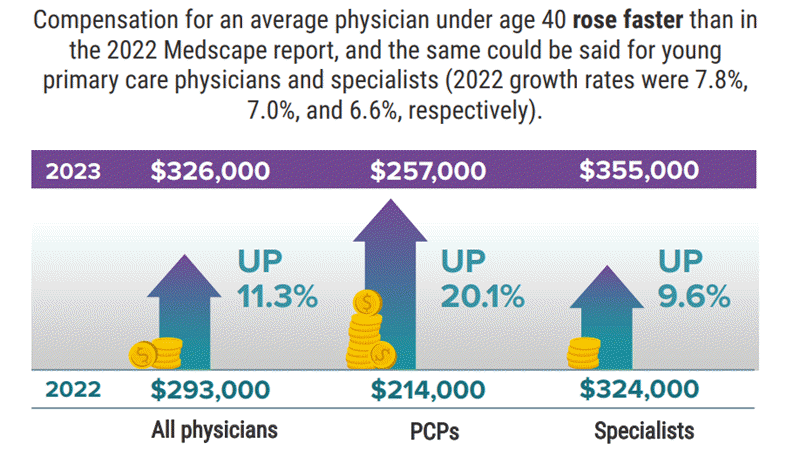Core Concepts
Young US doctors under 40 are experiencing pay rises above the industry average, yet many still feel underpaid.
Abstract
The content discusses the pay trends for young physicians under the age of 40 in the US. It highlights that despite an average pay increase of 11.3% last year, half of young doctors feel unfairly compensated. The gender pay gap, although narrowing, still impacts their profession. The infographic directs readers to the Medscape Young Physician Compensation Report 2023 for more detailed information.
Key Highlights:
Average pay increase of 11.3% for young physicians under 40.
Half of young US doctors feel they are not fairly paid.
Gender pay gap persists but is narrowing.
Infographic: Pay Rises Faster for Doctors Under Age 40
Stats
The 11.3% pay increase for young physicians under age 40.
Gender pay gap affecting young doctors.
Quotes
"Half of young US doctors said they don't feel fairly paid."
"A gender pay gap (although narrowing) continues to affect their ranks."
Key Insights Distilled From
by Jon Mckenna at www.medscape.com 10-02-2023
https://www.medscape.com/viewarticle/996801
Deeper Inquiries
How can the healthcare industry address the issue of young doctors feeling underpaid?
To address the issue of young doctors feeling underpaid, the healthcare industry can take several steps. Firstly, conducting regular salary reviews and adjustments based on market trends and cost of living can help ensure that young physicians are fairly compensated for their work. Additionally, offering performance-based incentives and bonuses can motivate young doctors and provide them with a sense of recognition for their hard work. Implementing transparent salary structures and providing opportunities for career advancement can also help young physicians see a clear path to financial growth within the organization. Moreover, creating mentorship programs and support networks for young doctors can help them navigate the complexities of salary negotiations and advocate for fair compensation.
What factors contribute to the gender pay gap among young physicians?
Several factors contribute to the gender pay gap among young physicians. One key factor is the tendency for women to be steered towards lower-paying specialties or positions within the healthcare industry. Additionally, gender biases and stereotypes can influence salary negotiations and performance evaluations, leading to disparities in pay between male and female physicians. The lack of transparency in salary structures and promotion processes can also contribute to the gender pay gap, as women may be less likely to advocate for themselves or negotiate for higher compensation. Furthermore, the impact of work-life balance and caregiving responsibilities can affect women's career trajectories and earnings, further widening the gender pay gap among young physicians.
How can social media platforms like Facebook, X, Instagram, and YouTube impact young physicians' perceptions of compensation?
Social media platforms like Facebook, X, Instagram, and YouTube can have a significant impact on young physicians' perceptions of compensation. These platforms provide a space for young doctors to share their experiences, discuss salary trends, and advocate for fair compensation within the industry. By following organizations like Medscape on social media, young physicians can access valuable resources such as compensation reports and salary negotiation tips, which can help them make informed decisions about their own pay. Additionally, social media can be a powerful tool for raising awareness about the gender pay gap and advocating for equal pay for all physicians. By engaging with like-minded professionals and sharing their stories on social media, young doctors can work towards creating a more transparent and equitable compensation system within the healthcare industry.
0
More on Healthcare
